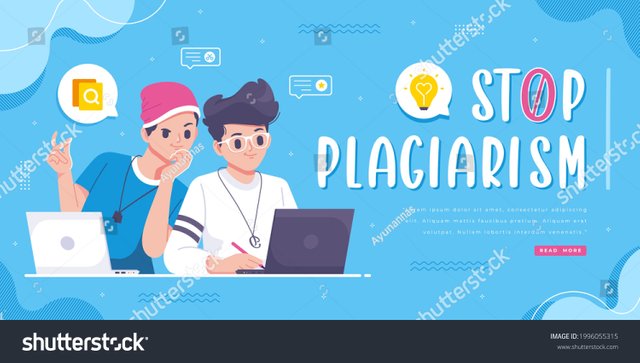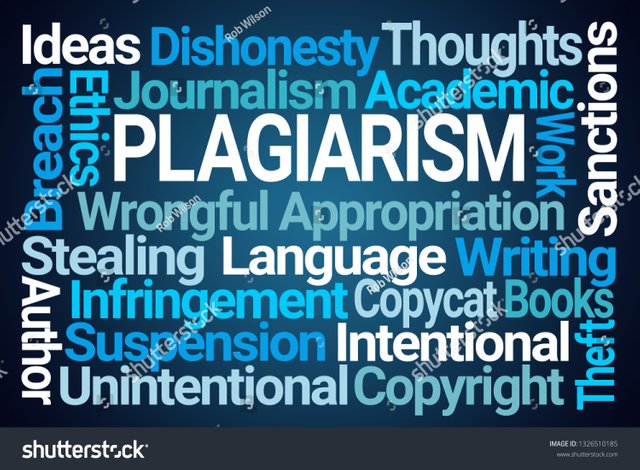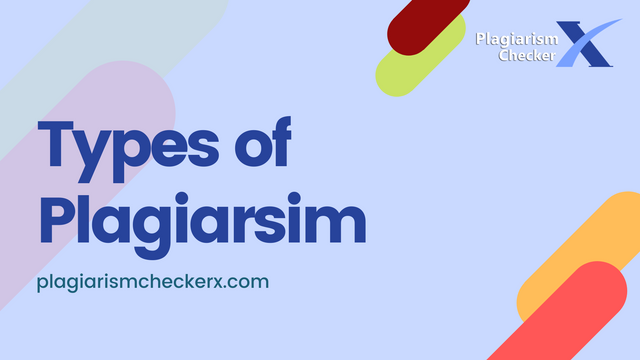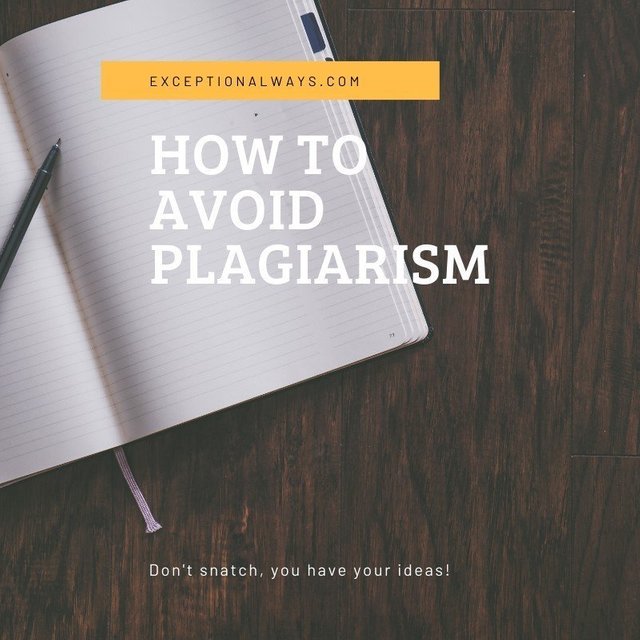Introduction
Welcome to my achievement NO.3 assignment by @deyaa, where I will mention plagiarism, types of plagiarism, ways to avoid plagiarism, proper citation demotions, and reference photos downloaded from websites.
Definition of plagiarism
Plagiarism is the act of presenting someone else's work or ideas as one whereas not giving credit to the initial author. By this definition, Plagiarism is additionally known as literal thieving.
The Merriam Webster dictionary defined Plagiarism as
transitive verb
: to steal and pass off (the ideas or words of another) as one's own: use (another's production) without crediting the source
intransitive verb
: to commit literary theft: present as new and original an idea or product derived from an existing source.
merriam-webster dictionary definition of plagiarism
Plagiarism is also a punishable offense, notably in most countries and whereas in different countries it's seen as education dishonesty. Plagiarism won't encourage exertions as a result of the initial author is being sidelined and being denied of their reward for proof of brain.
Types of Plagiarism
Everyone has had a conflict with plagiarism someday in their life associate degreed for others it's too frequent of an occurrence. Interestingly, plagiarism comes in several shapes and sizes thus everyone's expertise and plan regarding it varies. every variety of plagiarism has its own identifying characteristics and a signification that's helpful to understand. The more we know about the categories of plagiarism, the simpler it is to avoid them.
Self Plagiarism
Also known as auto-plagiarism it happens once you copy your own writing even if it wasn't on purpose. usually, the person during a self-plagiarism incident is summarizing or repurposing their own work rather than writing an entirely new piece from scratch on a constant topic.
Many people assume self-plagiarism is harmless as a result you aren’t stealing from some other person. This kind of plagiarism will be even as damaging as the other.Accidental Plagiarism
Accidental plagiarism happens once an individual neglects to cite their supplies, misquotes their sources, or accidentally paraphrases a source by victimization similar words, teams of words, and/or phrase structure while not attribution. Lack of intent doesn't absolve the scholar of responsibility for plagiarism.
Cases of accidental plagiarism are taken as seriously as the other plagiarism and are subject to constant vary of consequences as other varieties of plagiarismVerbatim Plagiarism (Direct Plagiarism)
Verbatim plagiarism, additionally called direct plagiarism and copy-paste plagiarism is an intentional and unethical type of stealing content. Direct plagiarism is the exact transcription of a district of somebody else’s work, while not attribution and without quotation marks.
The only time repetition and pasting would be possible are after you are quoting somebody and want to convey the precise words they used. Even that has to be sparsely used otherwise it might be classified as over-reliance on external sources and would defeat the aim of writing that is to supply original content in your words through your own thinkingMosaics Plagiarism (Patch-writing Plagiarism)
Mosaic Plagiarism, generally known as patch-writing happens once a writer borrows phrases from a supply while not mistreating quotation marks or finding synonyms for the author’s language whereas keeping to a similar general structure and which means of the initial. The work of somebody else is just paraphrased while not correct citation. It’s typically tough to find as a result of the plagiaristic material being complex with many various sources, as well as the writer’s own ideas and perspective.
The key to avoiding patch-writing is to completely and properly perceive the supply text you're mistreating so say it on paper as if you were explaining it in your own voice.Complete Plagiarism
We can conceive it as fraud for revealed and written materials. This type of plagiarism happens once somebody tries to submit a complete research paper as their own while not correcting attribution. You are stealing a full and totally written finished product, erasing the initial author's name, then you put your name.
The ways to avoid PLAGIARISM
Avoiding plagiarism is really easy now that you have a basic understanding of what it is. Here you can find out how you can avoid plagiarism in your writing.
Always Cite Your Source
When you cite any words or concepts in your writing with the sources, it shows that the concepts aren’t yours.Use Quotations
One of the simplest but most obvious ways to avoid plagiarism is to enclose the text in quotation marks to indicate that the words are not yoursParaphrase
Rewording the thought of an author in your own words will prevent plagiarism, rather than copying-pasting the text and making it looks like you are the one who wrote it.Come up with your own ideas
Read useful books, and believe yourself as a result of you have got your distinctive perspectives, the points you'll be able to give in your writing that’s fully your own.Plagiarism checker online tools
Check if your content is original once doubtful, victimization a web plagiarism checking tool will assist you to catch these problems before submitting your work. There are many online tools to check if your plagiarism score is high such as duplichecker and prepostseo
CONCLUSION
Plagiarism is a moral issue. An author who submits plagiarized work is committing thieving with the hope of making the most of that thieving. This is often true whether or not you’re returning a college paper or are an author by trade expecting financial compensation. It takes credit or profit far from the first creator of the work which can mean a lot of bother if the author takes proceedings against you.
Avoiding plagiarism is predominant as an author as a result it compromises your integrity. Apart from losing the respect of your mentors and peers, it may value your valuable skilled referrals and future career advancement.
"I have read and understood the Steemit Etiquette on Steemit Community and will do my best to embrace them" Source
That is my achievement 3 task and I really appreciate the effort done by @cryptokannon to show the importance of avoiding plagiarism.
Thanks and best regards @deyaa
Special thanks to:
@ngoenyi
@cryptokannon
@steemcurator03
@juichi




Hello @deyaa,
Don't forget to add tags to all your Steemit posts. Edit it and mention me after doing it correctly.
Thanks!
Downvoting a post can decrease pending rewards and make it less visible. Common reasons:
Submit
Hello @juichi
Sorry for this silly mistake, I put my tags but it is gone because of power down, and didn't notice that. I edited the post with the right tags. Waiting for your review.
Thanks and regards @deyaa
Downvoting a post can decrease pending rewards and make it less visible. Common reasons:
Submit
Your achievement task 3 is successfully verified. Please proceed to the next task at your convenience.
Downvoting a post can decrease pending rewards and make it less visible. Common reasons:
Submit
Thanks a lot @event-horizon
Best regards
Downvoting a post can decrease pending rewards and make it less visible. Common reasons:
Submit
Hi, @deyaa,
Your post has been supported by the the Steem Greeter Team.
Downvoting a post can decrease pending rewards and make it less visible. Common reasons:
Submit
Many thanks, @steemcurator03 for your support
Best Regards @deyaa
Downvoting a post can decrease pending rewards and make it less visible. Common reasons:
Submit